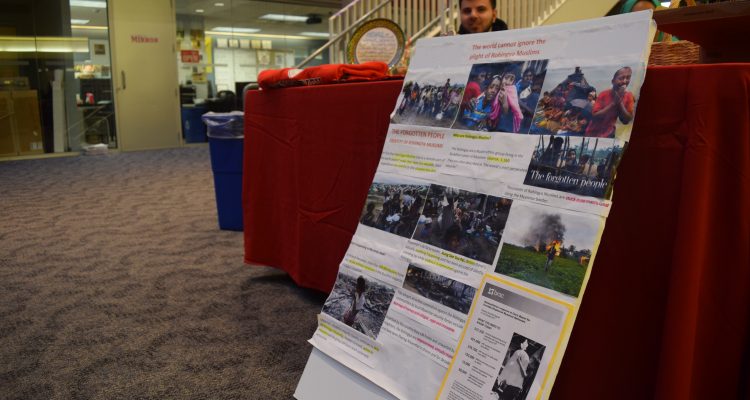Stories of military soldiers burning villages, raping and murdering civilians have been told by approximately 671,000 Rohingya refugees living in Bangladeshi refugee camps. The mass exodus of the Rohingya, a minority Muslim ethnic group, from the Southeast Asian majority Buddhist country of Myanmar has been deemed “one of the fastest growing” refugee crisis by the United Nations.
On April 10, the Jesuit University Humanitarian Action Network and the Muslim Student Association held an event to discuss the Rohingya refugee crisis as a part of the 8th annual Discover Islam Week. The event featured guest speakers: Ashley Toombs ‘07; Professor of History David McFadden Ph.D.; Professor of Politics and International Studies Janie Leatherman Ph.D.; and Nazia Khan.
Toombs serves at the manager of external affairs at Building Resources Across Communities, which is a global non-governmental organization that was founded in Bangladesh. BRAC was one of the many NGOs that helped set up and improve Rohingya refugee camps. Khan is an entrepreneur and member of the Islamic Society of Boston Cultural Center. Khan had the opportunity to volunteer at Cox’s Bazar, a refugee camp site.
During Discover Islam Week, each of the five events is associated with one of the five pillars of Islam. The first event, held on April 9, was a talk by Sheikh Faiyaz Jaffer, which symbolized the first pillar Shahada meaning “proclamation of faith.” Jaffer, an associate chaplain and research scholar at the Islamic Center at New York University, spoke about the modern implications of proclaiming faith.
The discussion about the Rohingya refugee crisis symbolizes the second pillar Zakat meaning “almsgiving.” The event emphasized the importance of charity in the Muslim faith. Khan explained that the act of giving is the process that purifies one’s own wealth. Khan elaborated that Zakat is ultimately selfish because it attempts to fill a personal, inner void, “you are more in need than to those to whom you are giving.”
Dr. McFadden explained the history of the conflict, which dates back the British colonization of Burma, which later became Myanmar. The relationship between the Myanmarese government and the Rohingya has been strained throughout the country’s history. Tensions came to a head when a Rohingya militant group attacked about 30 police and army posts. The government, which is a former military dictatorship, responded with a violent crackdown on Rohingya villages. This violence is what prompted the refugees to flee.
However, due to the Citizenship Law of 1982 the Rohingya lost their status as legal citizens of Myanmar. This left the Rohingya as a “stateless people,” McFadden explained, and this means they are not technically fleeing persecution of their own government as they have no government.
The issue of gender based violence was also discussed during the event. Dr. Leatherman explained the history of the United Nation’s involvement in the issue of sexual violence against women and detailed the atrocities that the Rohingya witnessed. She explained that this method of violence is cheaper than using guns and just as effective for driving people out of their land.
This connected back to the lack of citizenship of the Rohingya, as any land they owned was not legally enforced. Once the army had driven away the Rohingya villagers, they repurposed what was once their land for the government’s economic interests. Dr. Leatherman detailed how the Chinese have run a pipeline to transfer natural gas from Myanmar to China in Rakhine, the historic home of the Rohingya.
Dr. Leatherman described all of the international bodies that could affect change in this humanitarian crisis. But she was dismayed by the lack of global mobilization around this issue, “it’s hard to believe with all the resources we have that this is still true.”
In November of 2017, the United States State Department declared the violence an “ethnic cleansing,” and placed economic sanctions on a Myanmar military general accused of directing the violence. Despite international pressure to address this increasingly dire human rights issue, the Myanmarese government maintains that there is no ethnic cleansing. Government officials claim that the Rohingya burned their own villages and concocted the stories of sectarian violence.
Toombs spoke last at the event recounting her multiple trips to refugee camps. She showed a short video chronicling the chaos of the initial arrival of the refugees. BRAC has a three part plan for the camps, which she hopes will create a sense of permanence in the camp and give those affected by this crisis some normalcy.
Muslim Chaplin Nargis Alizada-Khan ‘13, concluded the talk by connecting the Shahada event to the Zakat event and to Fairfield’s Jesuit identity. She recounted the conversation about submitting yourself to God and the reflection that followed, “we ended up talking about the Ignatian spirituality questions… it really came down to the foundations of the art of giving. Giving a part of ourselves that will no longer belong to us, to the point where it hurts.”
“I’m glad so many people came and I hope we can take what we learn tonight and make some real change,” remarked one student in attendance, Nolan Wolfe ‘20.


And soon they’ll be talking about being victims again when we have to push them out for wanting to change our society and impose religion upon the infidels. Seriously, when Buddhists have had enough of you, it’s time to self-analyze.